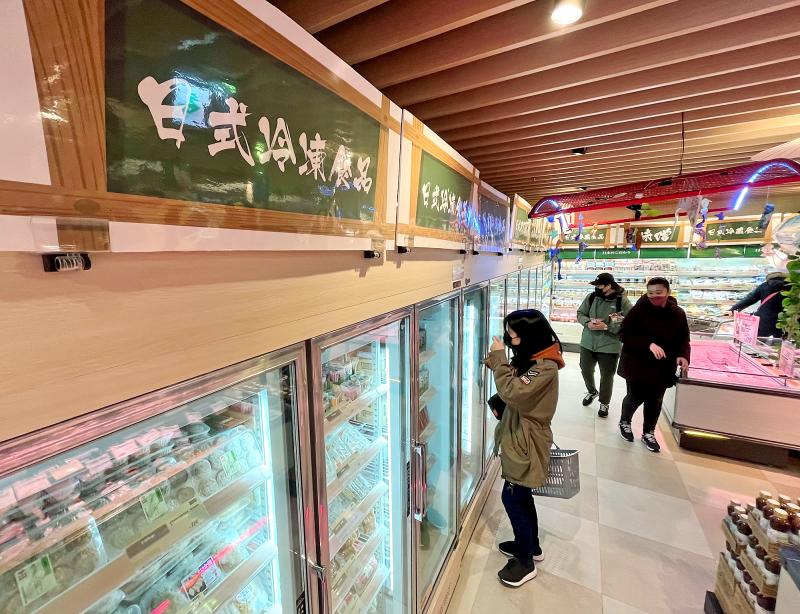The Food and Drug Administration (FDA) yesterday announced that food products from five Japanese prefectures that were banned after the Fukushima Dai-ichi nuclear power plant disaster in 2011 can now be imported to Taiwan, effective yesterday.
The Ministry of Health and Welfare on Feb. 8 promulgated draft measures for “types of food, and their production or manufacturing areas in Japan where imports are suspended,” saying that “designated foods imported from Japan shall be accompanied with a certificate of radioactive examination results for import inspection,” before opening a period of public comment.
“The proposals take effect immediately,” the FDA said.

Photo: CNA
The measures prohibit the importation of certain products, instead of banning all products from specific regions; require importers of high-risk food products to submit a certificate of origin and a certificate of radiation inspection; and require that food products from the five prefectures be inspected batch by batch.
About 17,000 imported food items are inspected for radioactive contamination each year, and an estimated 8,000 additional items would need to be inspected after the ban is lifted, Minister of Health and Welfare Chen Shih-chung (陳時中) said.
Taiwan has the capacity to conduct radioactive contamination inspections on up to 69,000 imported food items per year, so consumers need not worry, Chen said.
Food labels would indicate products imported from the five prefectures and inspection certificates would be included for certain food products, he said.
Asked whether 10 days were too short for public comment, Chen said that a referendum was held on the issue in 2018 and millions of people cast their votes, so it is not a new issue.
An adequate number of public comments was collected, he added.
The online Public Policy Participation Network Platform gathered 36 public comments: 17 in support of the policy, four against, and 15 that offered suggestions or inquired about the policy, he said.
The policy is based on scientific evidence and international food safety standards, Chen said, adding that public health would be safeguarded.
Asked when the first batch of food products from the five prefectures might arrive, Chen said he did not know any details, but had heard that some companies planned to import the products.

The Central Election Commission has amended election and recall regulations to require elected office candidates to provide proof that they have no Chinese citizenship, a Cabinet report said. The commission on Oct. 29 last year revised the Measures for the Permission of Family-based Residence, Long-term Residence and Settlement of People from the Mainland Area in the Taiwan Area (大陸地區人民在台灣地區依親居留長期居留或定居許可辦法), the Executive Yuan said in a report it submitted to the legislature for review. The revision requires Chinese citizens applying for permanent residency to submit notarial documents showing that they have lost their Chinese household record and have renounced — or have never

A magnitude 5.6 earthquake struck off the coast of Yilan County at 12:37pm today, with clear shaking felt across much of northern Taiwan. There were no immediate reports of damage. The epicenter of the quake was 16.9km east-southeast of Yilan County Hall offshore at a depth of 66.8km, Central Weather Administration (CWA) data showed. The maximum intensity registered at a 4 in Yilan County’s Nanao Township (南澳) on Taiwan’s seven-tier scale. Other parts of Yilan, as well as certain areas of Hualien County, Taipei, New Taipei City, Taoyuan, Hsinchu County, Taichung and Miaoli County, recorded intensities of 3. Residents of Yilan County and Taipei received

Taiwan has secured another breakthrough in fruit exports, with jujubes, dragon fruit and lychees approved for shipment to the EU, the Ministry of Agriculture said yesterday. The Animal and Plant Health Inspection Agency on Thursday received formal notification of the approval from the EU, the ministry said, adding that the decision was expected to expand Taiwanese fruit producers’ access to high-end European markets. Taiwan exported 126 tonnes of lychees last year, valued at US$1.48 million, with Japan accounting for 102 tonnes. Other export destinations included New Zealand, Hong Kong, the US and Australia, ministry data showed. Jujube exports totaled 103 tonnes, valued at

BIG SPENDERS: Foreign investors bought the most Taiwan equities since 2005, signaling confidence that an AI boom would continue to benefit chipmakers Taiwan Semiconductor Manufacturing Co’s (TSMC, 台積電) market capitalization swelled to US$2 trillion for the first time following a 4.25 percent rally in its American depositary receipts (ADR) overnight, putting the world’s biggest contract chipmaker sixth on the list of the world’s biggest companies by market capitalization, just behind Amazon.com Inc. The site CompaniesMarketcap.com ranked TSMC ahead of Saudi Aramco and Meta Platforms Inc. The Taiwanese company’s ADRs on Tuesday surged to US$385.75 on the New York Stock Exchange, as strong demand for artificial intelligence (AI) applications led to chip supply constraints and boost revenue growth to record-breaking levels. Each TSMC ADR represents